IFUGAO
TRIBE:
"BULUL" SEATED STATURE PAIR #12
|
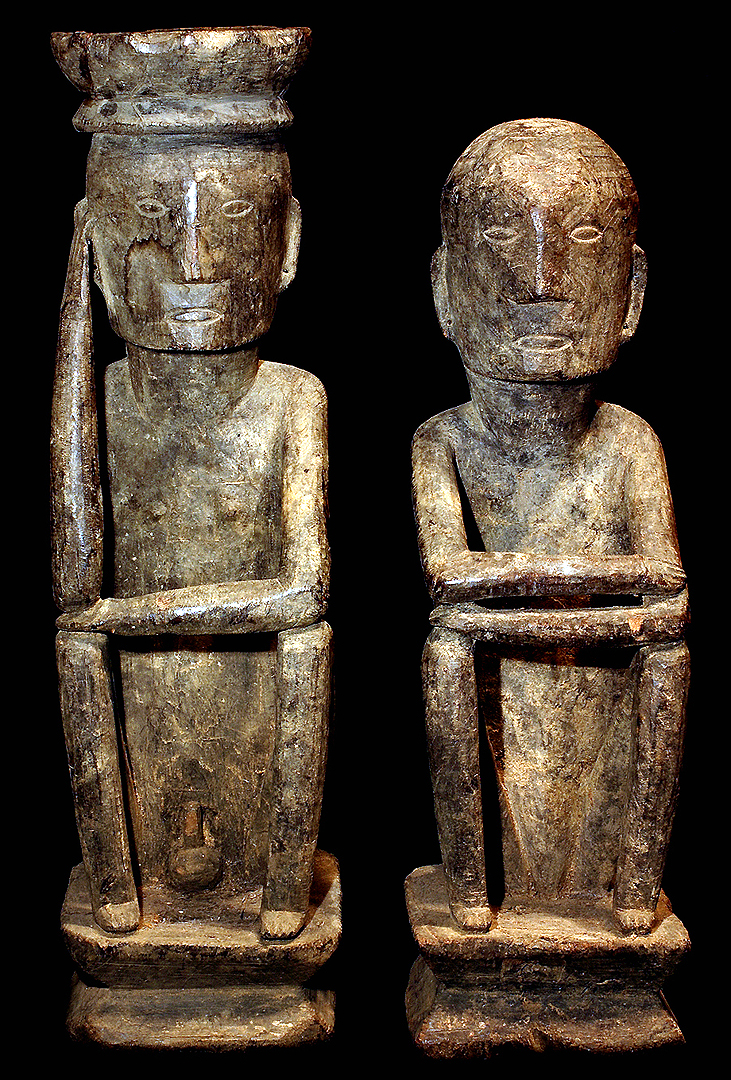
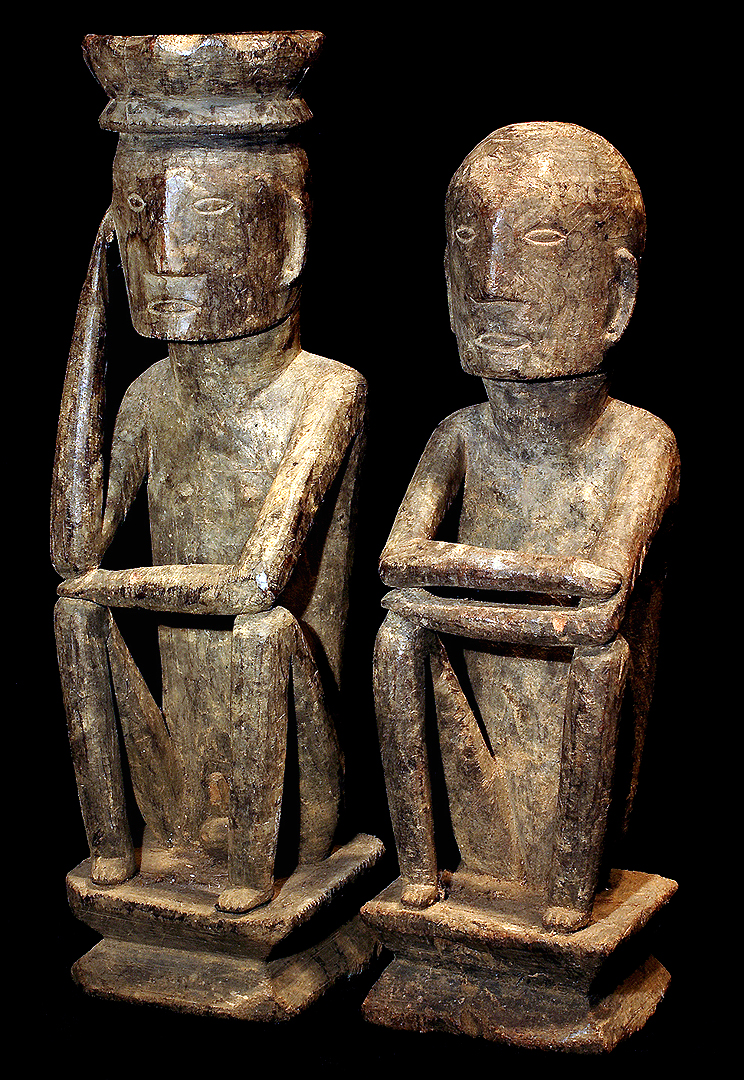
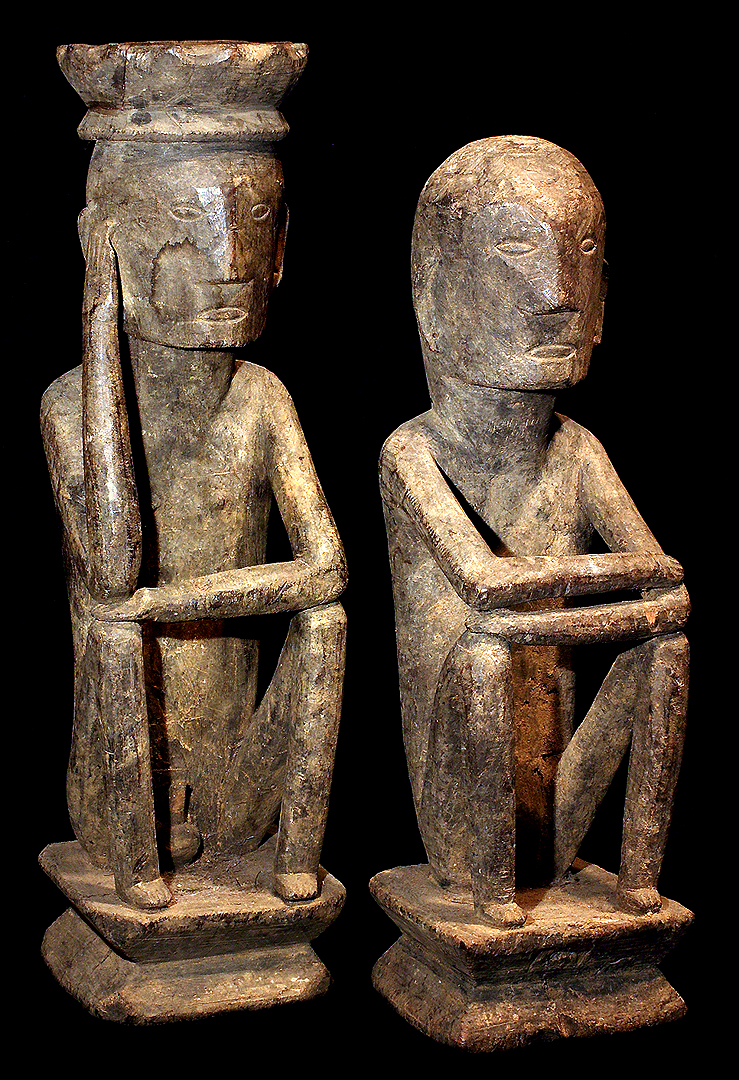
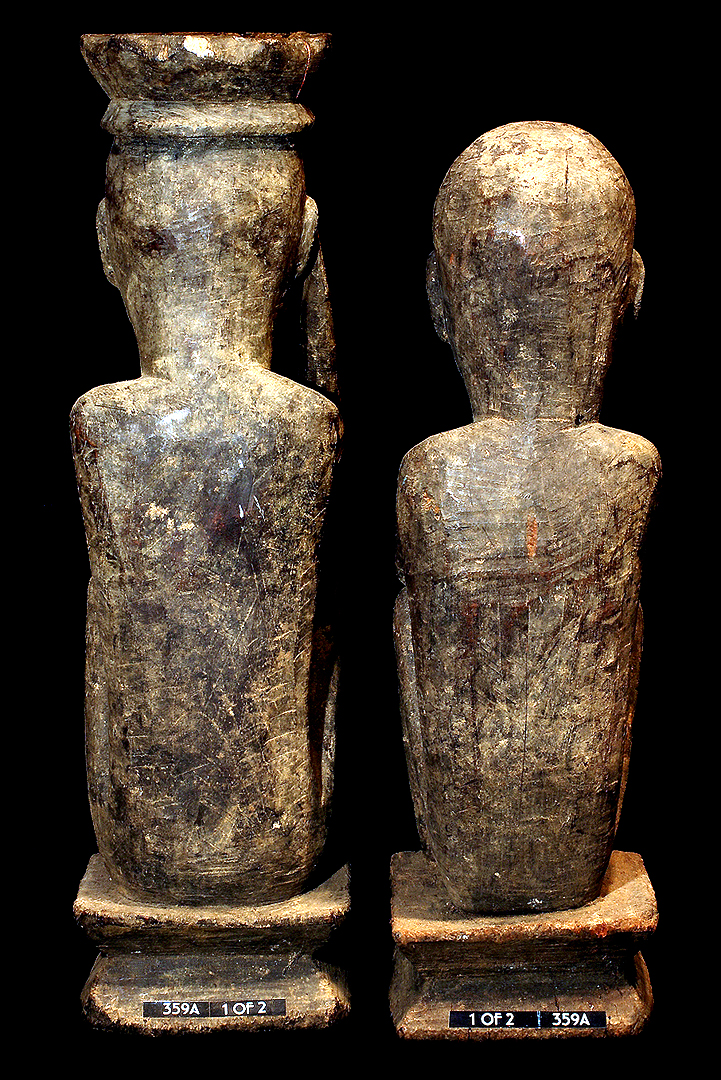
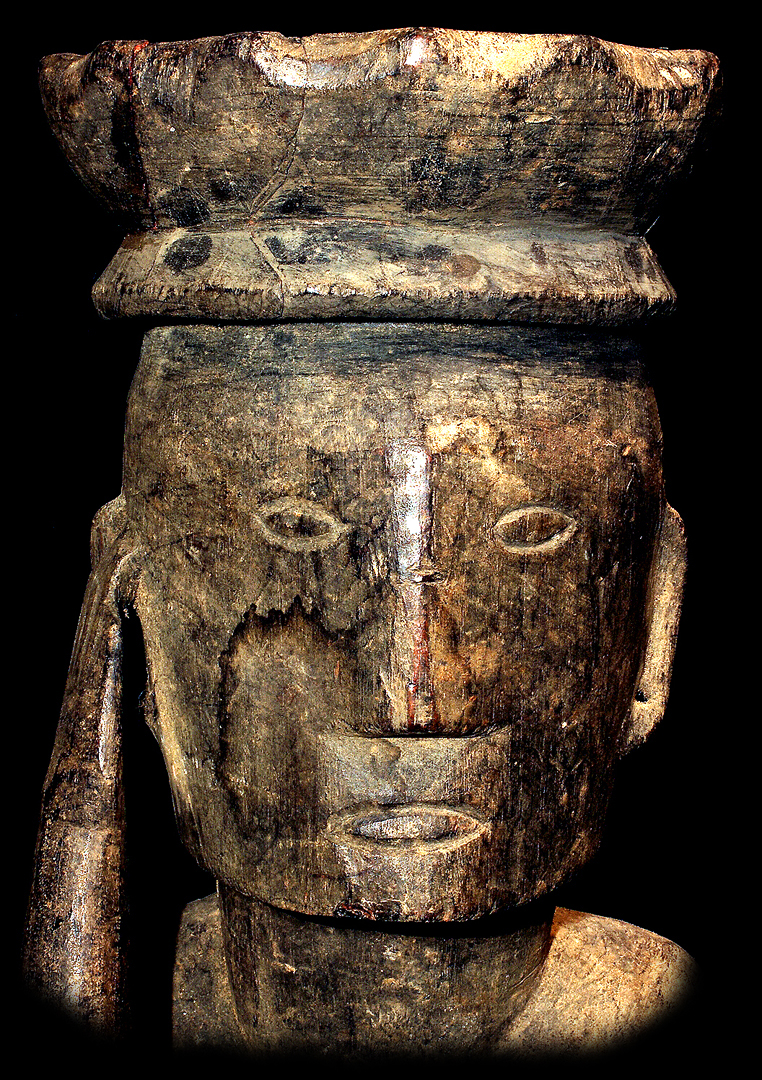
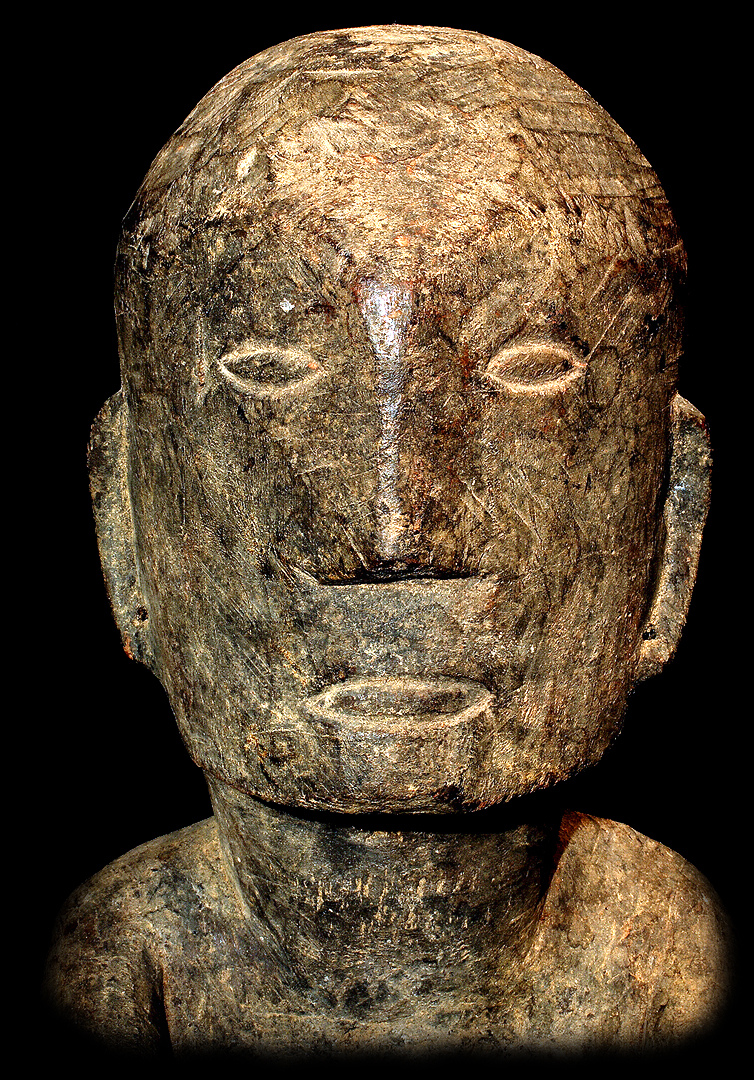
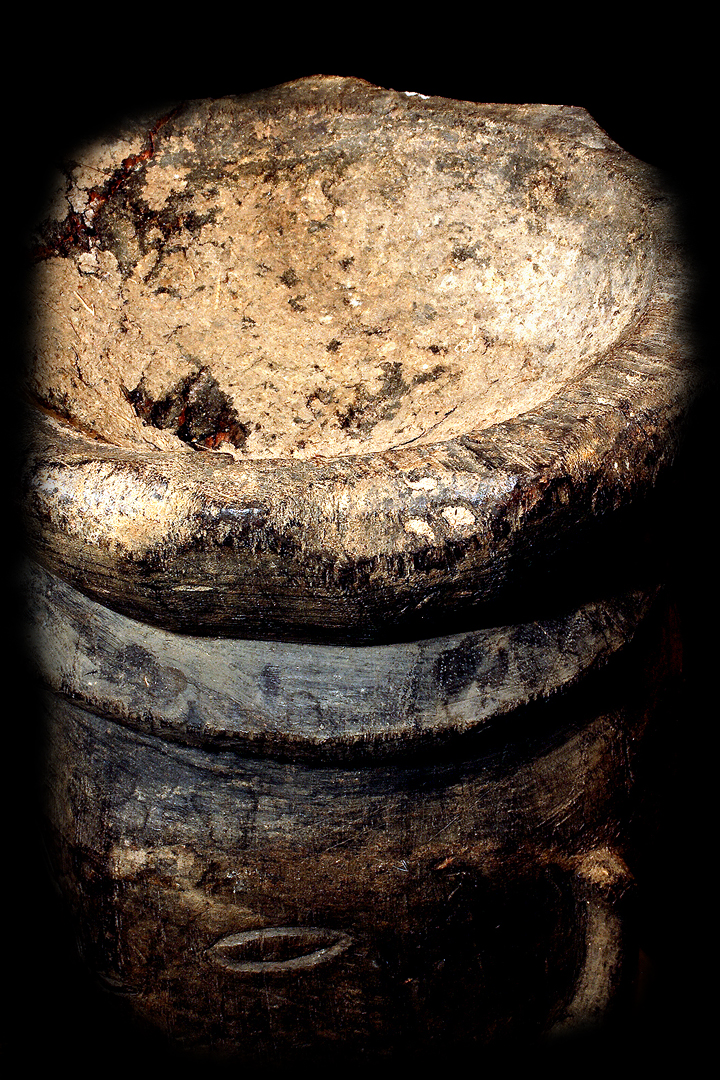
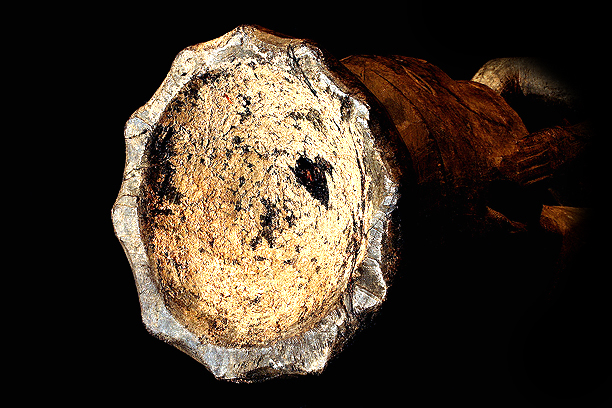
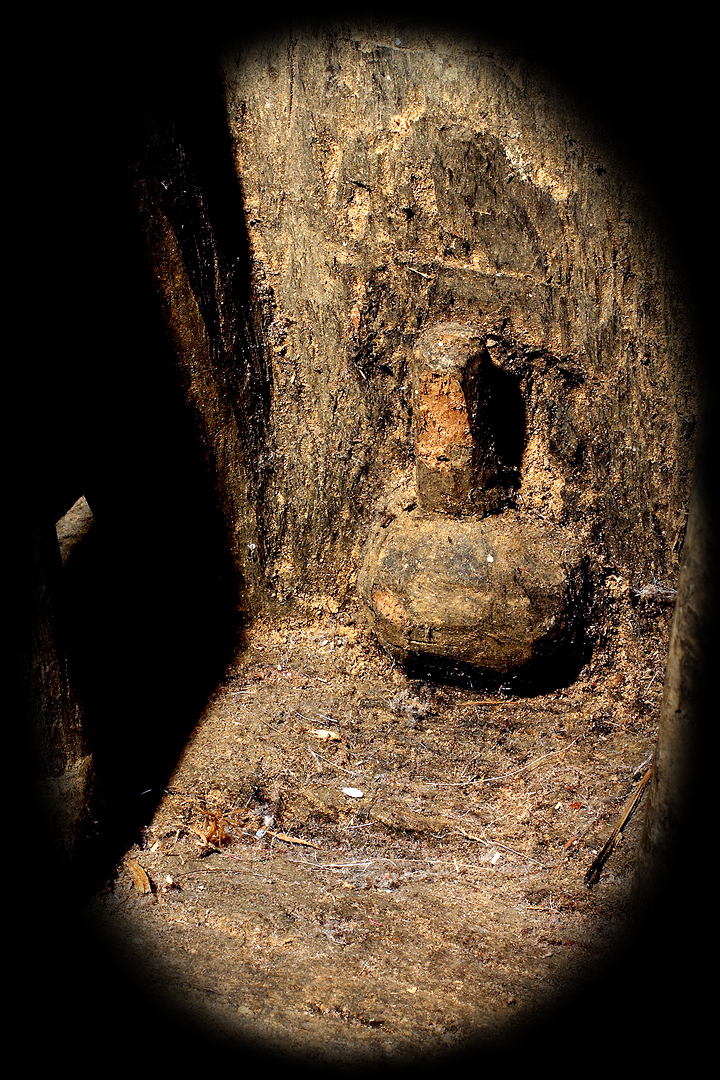
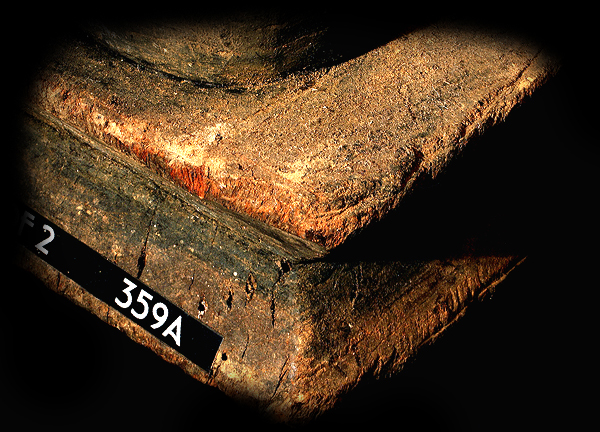
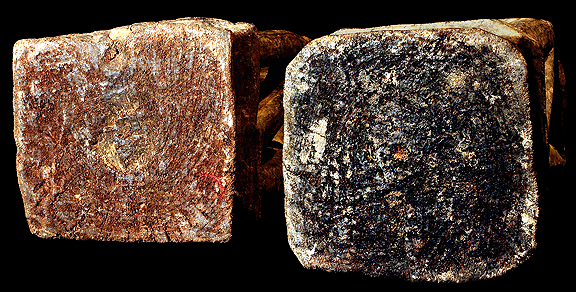

IFUGAO
TRIBE: "BULUL"
MALE AND FEMALE SEATED STATUE PAIR #12
AUTHENTIC, ANTIQUE, IFUGAO,
BULUL MALE AND FEMALE STATUE
PAIR; CIRCA 1800’S; THAT FEATURE A TRIBAL USED, OFFERTORY, “LABBA” STAR
BOWL ON THE TOP OF THE MALE’S HEAD! ACQUIRED FROM “WILLIAM BEYER” IN
THE 1960’S; SON OF THE INFAMOUS AMERICAN ANTHROPOLOGIST
“OTLEY BEYER.” THESE TWO REMARKABLE PIECES COME FROM THE HEAD HUNTING
TRIBE: "IFUGAO" IN THE CORDILLERA MOUNTAINS ON THE ISLAND "LUZON" IN
THE PHILIPPINES. THEY ARE IN EXCELLENT CONDITION OTHER THAN A FEW SMALL
INCIDENTAL CRACKS AND SCRATCHES. THERE ARE OLD COLLECTION STICKERS THAT
READ: “1 OF 2 359A” ON THE BACK OF EACH STATUE. THESE RARE AND UNUSUAL
PIECES HAVE A FINE, RICH, DARK, PATINA FROM SEVERAL APPLICATIONS OF
CEREMONIAL RICE WINE AND SACRIFICIAL ANIMAL OFFERINGS APPLIED OVER MORE
THAN A CENTURY OF ANNUAL IFUGAO CEREMONIAL “BAKLE” HARVEST FESTIVAL
RITUALS. THESE UNUSUAL BULUL PIECES MEASURE APPROXIMATELY 21 INCHES
TALL, BY 6 INCHES WIDE, BY 5 INCHES DEEP. THESE ARE EXTRAORDINARY
PIECES OF OLD TRIBAL ART!
A
Bulul is a carved wooden figure used to guard the rice crop by the
Igorot peoples of northern Luzon. The sculptures are highly stylized
representations of ancestors, and are thought to gain power from the
presence of the ancestral spirit. The Ifugao are particularly noted for
their skill in carving bululs. Bululs are used in ceremonies associated
with rice production and with healing. Creation of a bulul involves
alwen bulol ritual by a priest to ensure that the statue gains power.
The bulul is treated with care and respect to avoid the risk of the
spirits of the ancestors bringing sickness. The figures are placed in
rice granaries to bring a plentiful harvest. A large granary may need
two bululs, and a wealthy noble may also have one or more bululs in his
house. Male and female Bulul statues are often found together, with
sex-related symbols such as the mortar for the female and pestle for
the male. A male bulul may sometimes be decorated with a g-string, and
a female with a waist cloth, earrings and anklets. Although the form
varies, the bulul is commonly represented as seated on the ground, with
arms crossed over his upraised knees. The bulul has a simplified form,
and is traditionally carved from narra or ipil wood or sometimes stone.
The bulul is touched by hands dipped in blood of a chicken or pig in
ritual called tunod during the rice planting season. Over time the
blood imparts a dark color to the figures, overlaid with a patina of
grease from food offerings. Bululs are handed down to the first
child
of a family.Typically the older statues have
beetle holes made by
insects in the granary.
Ifugao
culture revolves around rice, which is considered a prestige
crop. There is an elaborate and complex array of rice culture feasts
inextricably linked with taboos and intricate agricultural rites, from
rice cultivation to rice consumption. Harvest season calls for
grandiose thanksgiving feasts, while the concluding harvest rites
"tungo" or "tungul" (the day of rest) entail a strict taboo of any
agricultural work. Partaking of the rice wine (bayah), rice cakes, and
'moma' (mixture of several herbs, powdered snail shell and betel nut/
arecoline: and acts as a chewing gum to the Ifugaos) is an indelible
practice during the festivities and ritual activitiess. their retual
and Agricultural terracing is their principal means of livelihood along
with farming. Their social status is measured by the number of rice
field granaries, family heirlooms, gold earrings, carabaos (water
buffaloes), as well as, prestige conferred through time and tradition.
The more affluent, known as kadangyan were usually generous by nature,
giving rice to poor neighbors in time of food shortage(s) and/or
hardship(s). Furthermore, their culture was known for their legal
system, using one of the world's most extensive oral legal traditions
specifying the offense depending on the use of custom law; trial by
elders (influenced in part by public opinion); or trial by ordeal. The
wealthy were subjected to greater fines than the poor.
Untouched
by the influences of Spanish colonialism, Ifugao culture
value kinship, family ties, religious and cultural beliefs. They're
unique among all ethnic groups in the mountain province, not only for
their interesting customs and traditions but also for their narrative
literature such as the hudhud, an epic dealing with hero ancestors sung
in a poetic manner. Another feature unique to the Ifugao is their
woodcarving art, most notably the carved granary guardians bului and
the prestige bench of the upper class, the hagabi. Their textiles
renowned for their sheer beauty, colorful blankets and clothing woven
on looms. Houses were well-built, characterized by as a square with
wooden floors, windowless walls, and pyramidal thatch roofs. Elevated
from the ground by four sturdy tree trunks, they feature removable
staircases that were hoisted up at night to prevent entry by enemies
and/or wild animals. Lastly, their attire remain traditional for male
Ifugaos, donning the wanno or g-string; there are six types of wanno
which are used depending on the occasion or the man's social status.
Ifugao women, on the contrary, wear tapis, a wraparound skirt; there
are five kinds of skirts worn, depending on the occasion
and or status
of the woman. |
THE
IFUGAO TRIBE, ON THE ISLAND: LUZON
IN THE PHILIPPINES, USE "BULUL" STATUES
AS GUARDIANS THAT ARE ACTIVATED
THROUGH RITUAL SACRIFICE.
THE IFUGAO; ORIGINALLY REFERRED TO AS "IGOROTS" WERE
ONCE THOUGHT TO BE INCLUDED WITH THE BONTOC, KALINGA
KANKANAY, IBALOI AND GADDANG AS A SINGLE TRIBE!
IT WAS NOT UNTIL EXHAUSTIVE RESEARCH LATER REVEALED
THESE WERE INDIVIDUAL TRIBES WITH DISTINCT
CULTURAL DIFFERENCES AND BELIEF SYSTEMS!
|
Asian tribal art, artifacts, ifugao, kalinga, bontoc,
asmat, dayak, philippines, asia, head hunters, human trophy skull,
skulls, african, antiques, naga, necklace, headdress, head hunting
trophy skull, Indonesia, Indonesian, SOUTHEAST ASIA, Borneo, Sarawak,
ANTIQUES, Kalimantan, Sulawesi, ART, Sumatra, Timor, ARTIFACTS, Bali,
Java, INDIA, Flores, Sumba, NEPAL, Savu, Roti, BABAS, Lombok, Malaysia.
HOLY MEN, Nusa Tengara, New Guinea, SHAMAN, Irian Jaya, Moluccas,
CONTEMPORARY ART, Tanimbar, Leti, OLD, Lembata, Alor, MINILA,
Philippines, Luzon, PALAWAN, Mindanao, Sulu, BLOW GUN, Southeast Asia,
Asia, NOSE RING, Asian, Burma,
HAT, Myanmar, India, SWORD, Nagaland, Nepal, KNIFE, Tibet, Himalaya,
MOUNTAIN, Himalayan, Assam, TRIBES, Thailand, Vietnam, YAO, Yunnan,
Hainan, HMONG, China, Central Asia, ZAO, Dayak, Batak, BAG, Toraja,
Naga, POLE, Chin, Li, QUIVER, Miao, Bahau, MASK, Punan, Penan, MODELED
SKULL,
Modang, Kayan, BRASS COIL, Kenyah, Ngaju, COILS, Kontu, Kantu, TEXTILE,
Iban, Maloh, PRIEST, Tunjung, Busang, RITUAL, Aoheng, Dong Son,
MYSTICAL
Konyak, Tangkhul, MYSTIC, Ao, Angami, PRIMITIVE, Sema, Wancho,
HAND MADE, Bontoc, B'laan, ARTIST, Bagabo, Gaddang, BULUL, Ifugao.
Sculpture, BULULS, statue, mask, BOX, beadwork, bead, AUTHENTIC,
textile,
weaving, TRIBAL, costume, hat, WOODEN, shield, spear, WOOD, helmet,
sword, BOAR, charm, fetish, FEATHERS, drum, basket, FEATHER, basketry,
jewelry, SILVER, ornament, weapon, ASMAT Canoe, amulet, decoration,
SCULPTURAL,
architecture, architectural, SCULPTURE, longhouse, headhunter, SKULL,
headhunting, shaman, TRIBAL, festival, ceremony, ceremonial, SHAMAN
ritual, tattoo, HEAD HUNTER Skull, dragon, hornbill, HEADDRES, art,
tribal,
VIETNAM, tribe, culture, TRIBES, cultural, myth, TRIBAL, artifact,
artefact, REAL, wood, stone, HAND WOVEN, cotton, metal, CAST bronze,
brass,
cloth, ISLAND, tropics, tropical, EQUATOR, ethnographic, EQUATORIAL,
Tribal Art, Primitive Art, Ethnographic Art, Oceanic Art, Folk Art,
Ethnic Cultures, AUTHENTIC Artifacts, Textiles, ANCIENT, Costumes,
Sculpture, SCULPTURES, Masks, Beadwork, BEADS, Fetishes, Charms, GOLD
Jewelry, Baskets, BAMBOO, Weapons, Shields, ORNATE, Indonesia, Borneo,
PUPPETS,
Sumatra, Sulawese, SHADOW PUPPET, Java, Bali, CAVE, Timor, Flores,
ISLAND, Sumba. Lombok, VILLAGE, Molucca, Philippines, RICE TERRACE,
Luzon,
Mindanao, DAVID HOWARD PHOTOGRAPHY, Nepal, Burma, SACRED JOURNEY:
THE GANGES TO THE HIMALAYAS, Thailand, THE LAST FILIPINO HEAD HUNTERS,
Laos,
Vietnam, TEN SOUTHEAST ASIAN TRIBES FROM FIVE COUNTRIES, India, Central
Asia,
NECKLACES, Southeast Asia, Dayak, STATUE, lban, Kayan, INK STAMP,
Kenyah, Modang, FEATHERED, Bahau, Ngaju, HORSE, Batak, Toraja,
NAGALAND,
Naga, Dong Song. TRIBAL ART, AUTHENTIC PRIMITIVE ART, OLD ETHNOGRAPHIC
ART, RARE OCEANIC ART, BEAUTIFUL FOLK ART, ETHNIC CULTURES,
TRIBAL
ARTIFACTS, TEXTILES, ASIAN, COSTUMES, SCULPTURE, WOOD MASKS, BEADWORK,
CHARMS,
FETISHES, SIVER JEWELRY BOXES, BASKETS, WEAPONS, FILIPINO SHIELDS,
INDONESIA, BORNEO, ETHNOGRAPHIC, SUMATRA, SULAWESE, TRIBAL, JAVA,
BALI, TRIBES, TIMOR, FLORES, ASIAN, SUMBA. LOMBOK, TRIBES, MOLUCCA,
PHILIPPINES, TRIBAL, LUZON, ASIAN, MINDANAO, NEPAL, ASIA, BURMA,
THAILAND, TRIBAL,
LAOS, VIETNAM, TRIBES, INDIA, CENTRAL TRIBAL ASIA, ARTIFACTS, SOUTHEAST
ASIA, HEAD HUNTER, DAYAK, ASIAN, IBAN, KAYAN, TRIBE, KENYAH, MODANG,
TRIBAL,
BAHAU, NGAJU, ASIAN, BATAK, TORAJA, TRIBE, NAGA, tribal art, ASIAN,
primitive art, ASIA, ethnographic art, TRIBAL, oceanic art, ASIAN
folk art, SOUTHEAST ASIA ethnic cultures, artifacts, ASIAN, textiles,
costumes,
VILLAGE sculpture, masks, TRIBAL beadwork, fetishes, TRIBES charms.
jewelry, TRIBE, baskets, weapons, TRIBAL, shields, indonesia, ASIAN,
borneo. sumatra, TRIBAL ART sulawese, java, HILL TRIBE, bali, timor,
ASIAN,
flores, sumba, TRIBES, lombok, molucca, BULUL STATUES philippines,
luzon, ISLAND ART, mindanao, nepal, ASIA, burma, thailand, JOURNEY
laos, vietnam, TRIBAL, india, central asia, TRIBE, southeast asia, OLD
ART, dayak. lban, TRIBES, kayan, kenyah, ASIAN, modang, bahau,
AUTHENTIC
TRIBAL ART, ngaju, batak, HEADDRESS, toraja, naga, MOUNTAIN PROVINCE,
dong
song, KALINGA, Indonesia, Indonesian, IFUGAO, Borneo, Sarawak,
BONTOC, Kalimantan, Sulawesi, TRIBAL, Sumatra, Timor, ASIAN, Bali,
Java, OLD TRIBAL ART